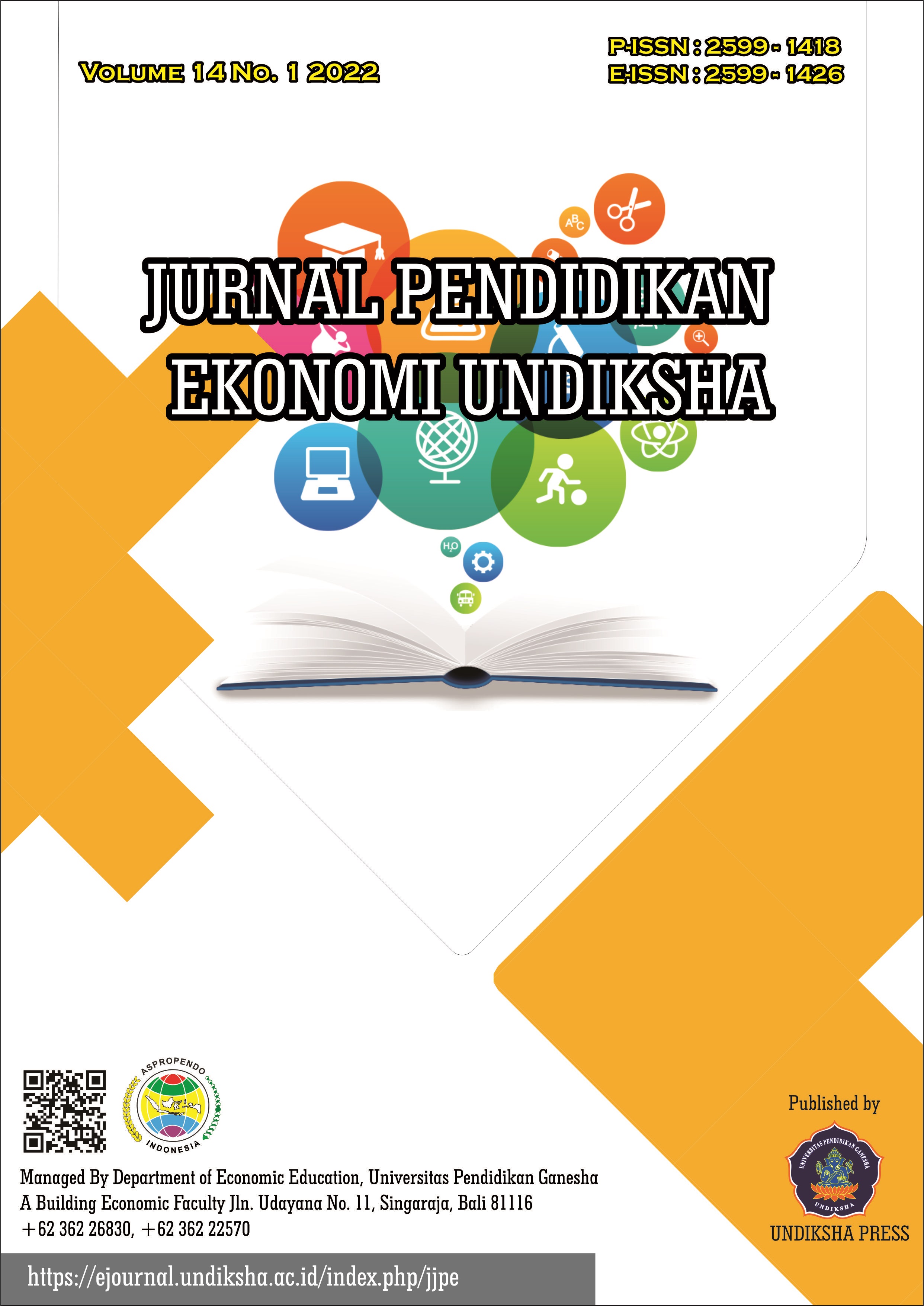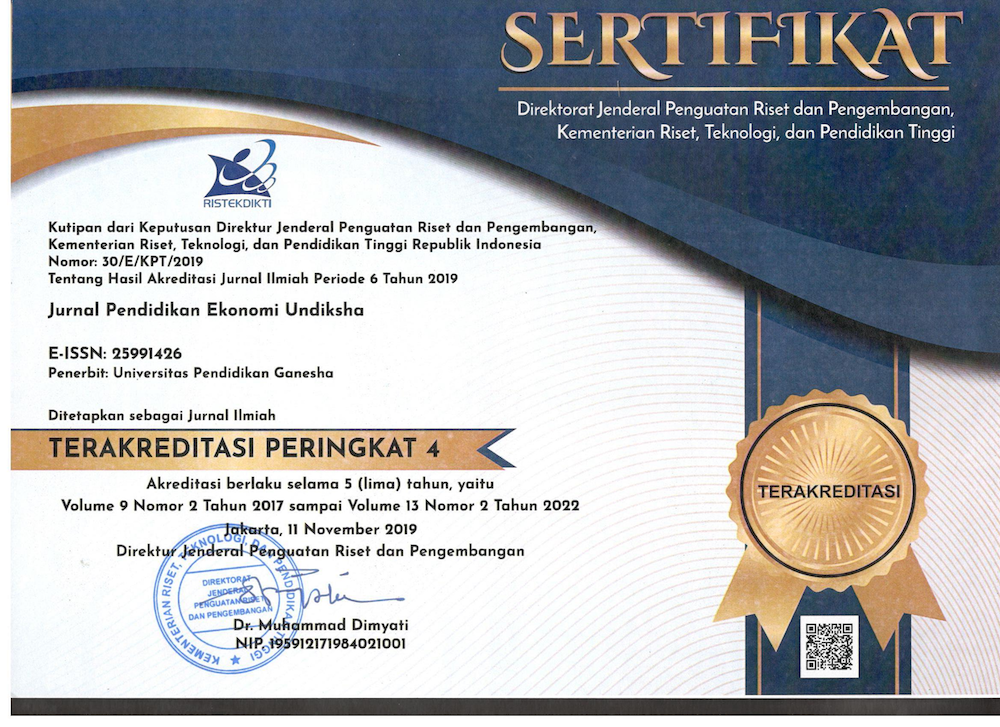Pengaruh Tingkat Pendidikan, Modal dan Teknologi Terhadap Daya Saing Usaha Mikro, Kecil dan Menengah (UMKM) di Kecamatan Sawan
DOI:
https://doi.org/10.23887/jjpe.v14i1.36385Keywords:
Level of education, Capital, Technology, Competitiveness, MSMEsAbstract
The purpose of this study is to determine (1) the effect of the level of education, capital and technology partially on the competitiveness of micro, small and medium enterprises (MSMEs) in Sawan District, (2) the influence of the level of education, capital and technology simultaneously on business competitiveness. micro, small and medium enterprises (MSMEs) in Sawan District, (3) the magnitude of the influence of the level of education, capital and technology on the competitiveness of micro, small and medium enterprises (MSMEs) in Sawan District. This type of research is causal research with a quantitative approach. The population in this study were all formal MSMEs in Sawan District, Buleleng Regency as many as 2,365 with a sample of 343 respondents who were determined using the Slovin formula. Data collection methods used are interviews and questionnaires. Then, the data analysis technique used is multiple linear regression analysis. The results of this study indicate that (1) there is a partially significant influence between the level of education, and capital on the competitiveness of micro, small and medium enterprises (MSMEs) in Sawan District. Meanwhile, technology does not affect the competitiveness of micro, small and medium enterprises (MSMEs) in Sawan District, (2) there is a simultaneous significant effect between the level of education, capital and technology on the competitiveness of micro, small and medium enterprises (MSMEs) in Sawan District, (3) the magnitude of the influence of the level of education, capital, and technology on the competitiveness of MSMEs is 51.3% while 48.7% is influenced by other variables not tested in this study.
References
Dinas Perdagangan Perindustrian Koperasi dan UKM Kabupaten Buleleng 2019. (2019). Jumlah UMKM di Kabupaten Buleleng. Buleleng.
Maflikhah, N. (2010). Peran Teknologi Informasi pada Niat untuk Mendorong Knowlegde Sharing Karyawan Sekretariat Daerah Pemerintah Kota Surakarta (Sebuah Pengujian terhadap Teori Difusi Inovasi). Jurnal Ekonomi Universitas Sebelas Maret.
Pemerintah Republik Indonesia. (2013). Undang-Undang Nomor 20 Tahun 2008 tentang Usaha Mikro Kecil Menengah (UU UMKM).
Purwanti, E. (2012). Pengaruh Karakteristik Wirausaha, Modal Usaha, Strategi Pemasaran terhadap Perkembangan UMKM di Desa Dayaan dan Kalilondo Salatiga. Among Makarti, 5.
Putri, K. . (n.d.). Pengaruh Karakteristik Kewirausahaan. Jurnal Ilmu Administrasi Bisnis UNDP.
Rudjito. (2003). Strategi Pengembangan UMKM Berbasis Strategi Bisnis (Makalah Yang Disampaikan Pada Seminat Peran Perbankan Dalam Memperkokoh Ketahanan Nasional Kerjasama Lemhanas RI Dengan BRI).
Sugiyono. (2014). Statistika untuk Penelitian. Bandung:CV Alfabeta.
Suharyadi, & Purwanto. (2004). Metodelogi Penelitian. Jakarta: Gramedia Pustaka Utama.
Suparmoko, & Irawan. (2003). Ekonomika Pembangunan (Edisi keen). Yogyakarta:BPFE UGM.
Tambunan, T. . (2017). Usaha Mikro, Kecil, Menengah. Jakarta: Ghalia Indonesia.
Utari, T., & Dewi, P. M. (2014). Pengaruh Modal, Tingkat Pendidikan dan Teknologi terhadap Pendapatan Usaha Mikro Kecil dan Menengah (UMKM) di Kawasan Imam Bonjol Denpasar Barat. EP Unud, 3.
Wulansari, A. (2015). Menuju Ekonomi Berdikari Pemberdayaan UMKM dengan Konsep Opop-Ovp-Ovoc. Yogyakarta:Media Pressin.
Yuniarta, G. A. (2017). Program Pendampingan Wirausaha dalam Rangka Peningkatan Daya Saing UMKM di Kabupaten Buleleng.
Yusuf, M. (1982). Pengantar Ilmu Pendidikan. Jakarta: Ghalia.
Downloads
Published
How to Cite
Issue
Section
License
Copyright (c) 2022 Jurnal Pendidikan Ekonomi Undiksha

This work is licensed under a Creative Commons Attribution-ShareAlike 4.0 International License.





